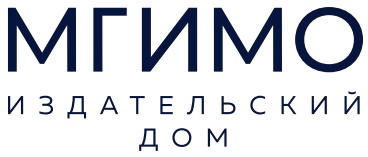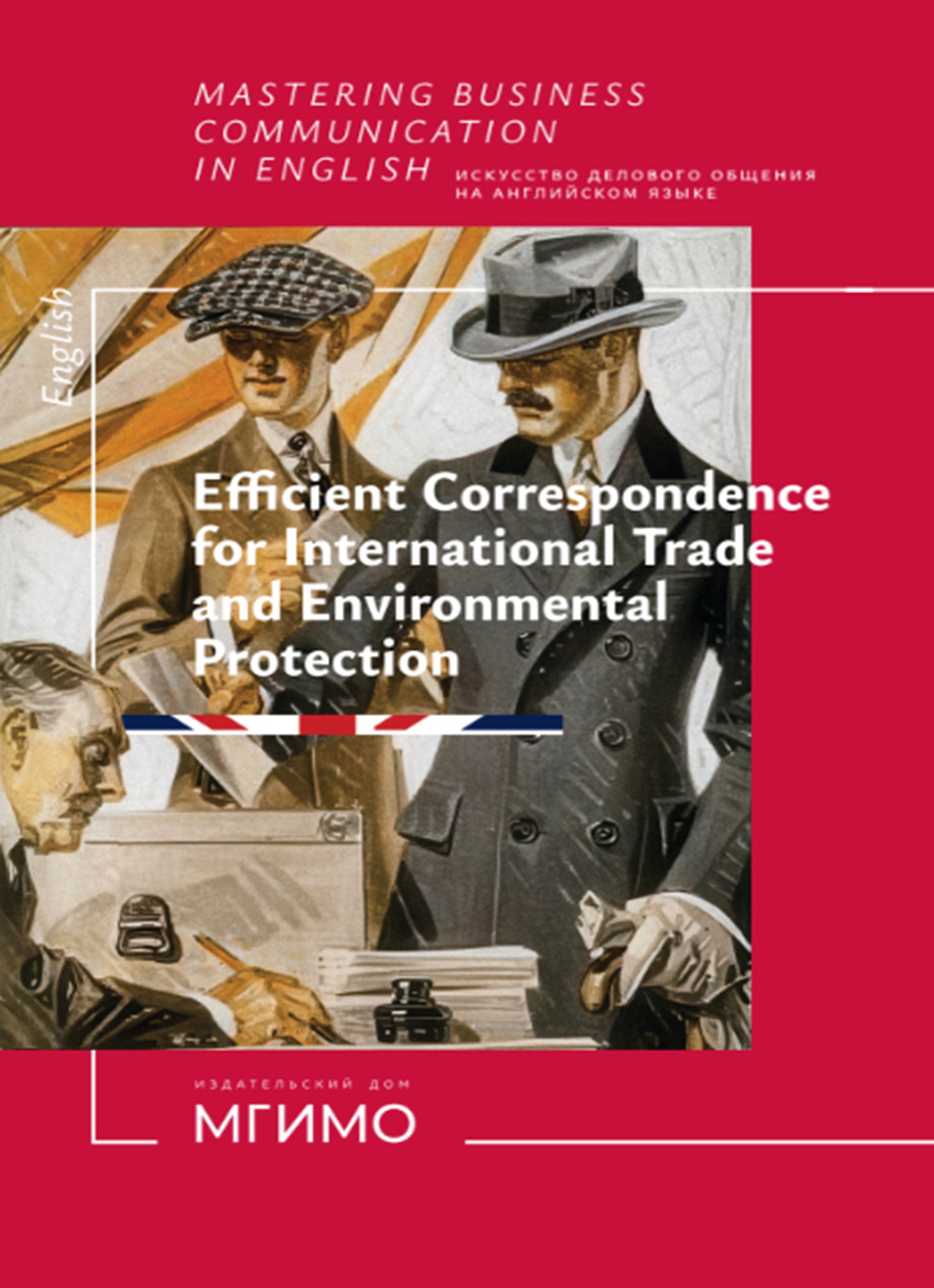Russian Federation
Russian Federation
Russian Federation
Russian Federation
This course is designed for university students of International Trade and Environmental Protection. It is aimed at building up students’ competences that enable them to be efficient in solving various professional tasks using English as means of international communication. The course structure comprises two parts: Part 1. Efficient Correspondence for International Trade and Environmental Protection, Part 2. Dialogues in professional Situations in International trade and Environmental protection. Part 1 covers some grammar material, authentic sample business correspondence of different areas, advertising matters and the like. The topics to be studied are: University Correspondence; Proposals; Sponsorship; Vacancies. Teaching methods are based, on the one hand, on a multiple and diverse training of professionally orientated vocabulary in various exercises, on the other hand, on activating the said vocabulary in creative tasks, including case analysis. The Supplement Notes on Linguistic Pragmatics introduces students to some basic issues of linguopragmatics, which helps them enhance the efficiency of rhetorical impact on a partner. To that end the tasks under the heading Linguopragmatic Commentary in units 2-8 are suggested. For students whose command of English is at least Upper Intermediate, with the target level being Advanced.
English; business communication; international trade, environmental protection; efficient communication; correspondence; applied pragmalinguistics
1. Beznaeva O. A. Kognitivno-pragmaticheskie osobennosti predstavleniya informacii v delovom diskurse (na materiale angloyazychnoy delovoy korrespondencii): Dissertaciya na soiskanie uchenoy stepeni kandidata filologicheskih nauk. — Belgorodskiy gosudarstvennyy universitet. —Arhangel'sk, 2009. — 183 s. EDN: https://elibrary.ru/NQJUBZ
2. Kategoriya yazykovoy vezhlivosti i ee kompleksnoe opisanie (k postanovke problemy) / N. G. Bragina, O. S. Issers, I. Mendoza, R. Ratmayr // Kommunikativnye issledovaniya. — 2021. — T. 8. — № 2. — S. 217–232. — DOI:https://doi.org/10.24147/2413-6182.2021.8(2). — S. 217–232. DOI: https://doi.org/10.24147/2413-6182.2021.8(2).217-232; EDN: https://elibrary.ru/QLDZIW
3. Grays G. P. Logika i rechevoe obschenie / G. P. Grays // Novoe v zarubezhnoy lingvistike.— Vyp. 16. Lingvisticheskaya pragmatika. — Moskva : Progress, 1985. — S. 217–237. — URL: https://textarchive.ru/c-1502751.html
4. Karnegi D. Kak zavoevyvat' druzey i okazyvat' vliyanie na lyudey / D. Karnegi ; perevod A. A. Pozdnyakova. — URL: https://psv4.userapi.com/s/v1/d/ZPSZhXk6CzNA8WNzK9fb5HEwMVtj3HIcsRteOpgDr6mUYKWJQr3uOflJNbI9n2hRty-kQFL7aLCbsl_iyq4QWsZpLveK0mwjC04dSdzu3GdAplzl/carnegie_dale_how_to_win_friends_infl uence_people.pdf
5. Larina T. V. Kategoriya vezhlivosti i stil' kommunikacii: Sopostavlenie angliyskih i russkih lingvokul'turnyh tradiciy / T. V. Larina. — Moskva : Yazyki slavyanskih kul'tur, 2009. — 507 s. EDN: https://elibrary.ru/SUQIKR
6. L'yuis R. D. Delovye kul'tury v mezhdunarodnom biznese: Ot stolknoveniya k vzaimoponimaniyu / R. D. L'yuis. — Moskva : Delo, 1999. — 440 s.
7. Malahova V. L. Algoritm transformacii pragma-semanticheskogo smysla v sisteme angliyskogo diskursa / V. L. Malahova // Funkcional'nye aspekty sintaksisa germanskih yazykov: kollektivnaya monografiya; pod obsch. red. A. V. Averinoy, I. A. Shipovoy. — Moskva : Pero, 2022. — S. 124–143.
8. Ponomarenko E. V. Ironiya kak ritoricheskiy priem mezhnacional'nogo delovogo obscheniya / E. V. Ponomarenko // Lingvostranovedenie: metody analiza, tehnologii obucheniya. Pyatyy mezhvuzovskiy seminar po lingvostranovedeniyu : cb. statey: V 2 ch. Ch. 1. Yazyki v aspekte lingvostranovedeniya / Otv. red. L. G. Vedenina. — Moskva : MGIMO-Universitet, 2008. — S. 80–89. EDN: https://elibrary.ru/UEFXGV
9. Ponomarenko E. V. Funkcional'nye svoystva ironii v angliyskom delovom diskurse / E. V. Ponomarenko // Vestnik Camarskogo universiteta. Istoriya, pedagogika, filologiya. — 2016. — № 2. — S. 171–176. —URL: https://journals.ssau.ru/hpp/article/view/4245
10. Ponomarenko E. V. Rechevye strategii i taktiki kak vazhneyshiy aspekt formirovaniya professional'nyh kompetenciy ekonomistov-mezhdunarodnikov / E. V. Ponomarenko // Yazyki v sovremennom mire : materialy VIII Mezhdunarodnoy nauchnoy konferencii: [sbornik] / otv. red. L. V. Polubichenko. — Moskva: KDU, 2009. — S.492–499.
11. Ponomarenko E. V. Variativnost' rechevyh strategiy i taktik kak sredstvo povysheniya pragmaticheskogo vozdeystviya v angliyskom delovom diskurse: Sbornik statey XIV Mezhdunarodnoy konferencii «Rossiya i Zapad: dialog kul'tur» (24–26 noyabrya 2011 goda). Otv. red. A. V. Pavlovskaya. — Vyp. 16. — Ch.IV. — Moskva : MGUim. M. V. Lomonosova, 2012. — S. 257-264.
12. Potebnya A. A. Teoriya slovesnosti: Tropy i figury / A. A. Potebnya. — Moskva : KRASAND,
13. Radyuk A. V. Kooperativnye rechevye strategii i taktiki v angliyskom delovom diskurse : monografiya / A. V. Radyuk. — Moskva : RUDN, 2016. — 163 s. EDN: https://elibrary.ru/ZEFKXR
14. Bloch A. Murphy’s Law Complete / A. Bloch. — London: Arrow Books, 2002.
15. Carnegie D. How to Win Friends and Infl uence People / D. Garnegie. — New York : Simon & Schuster, 2022. — pr. 52–57. — Available at URL: https://sacredtraders.com/wp-content/uploads/How-to-Win-Friends-and-Infl uence-People-By-Dale-Carnegie.pdf
16. Carroll L. Alice’s Adventures in Wonderland. Ch. 3. A Caucus-Race and a Long Tale / L. Carroll. — URL: https://www.gutenberg.org/fi les/11/11-h/11-h.htm
17. Grice H. P. Logic and conversation / H. P. Grice //Syntax and semantics. — Vol. 3. — Speech acts. New York: Academic Press, 1975. — pp. 41–58. — Available at URL: https://lawandlogic.org/wp-content/uploads/2018/07/grice1975logic-and-conversation.pdf DOI: https://doi.org/10.1163/9789004368811_003
18. Khramchenko D. Irony as a tendency of modern business english: functional-linguistic theory & teaching practice / D. Khramchenko // EDULEARN 19 Proceedings. 11th International Conference on Education and New Learning Technologies, 2019. — rr. 1983–1987. DOI: https://doi.org/10.21125/edulearn.2019.0546
19. Khramchenko D. The mechanism of verbal warfare & polarization: Exploring communicative strategies in American political discourse / D. Khramchenko // Journal of Research in Applied Linguistics. — Issue 16(1). — 2025. — pr. 105–124. — DOI: https://doi.org/10.22055/RALS.2024.47805.3363
20. Leech G. Principles of Pragmatics / G. Leech. — London, New York: Longman, 1983. — 250 p.— Available at URL: https://archive.org/details/principlesofprag0000leec/page/n1/mode/2up
21. Leech G. The Pragmatics of Politeness / G. Leech. — Oxford: Oxford University Press, 2014.— 299 p. DOI: https://doi.org/10.1093/acprof:oso/9780195341386.001.0001
22. Malyuga E. N. Linguopragmatic aspect of idiomatic expressions in English business discourse / E. N. Malyuga, O. V. Aleksandrova // European Proceedings of Social and Behavioural Sciences 2020. Topical Issues of Linguistics and Teaching Methods in Business and Professional Communication, 2020. — pp. 1–6. — DOI:https://doi.org/10.15405/epsbs.2020.12.02.1 EDN: https://elibrary.ru/WXNESB
23. Malyuga E. N. Communicative strategies and tactics of speech manipulation in intercultural business discourse / E. N. Malyuga, B. Tomalin // Training, Language and Culture. — Issue 1(1). — 2017. — pr. 28–45. —https://doi.org/10.29366/2017tlc.1.1.2 Introduction: professional discourse in the focus of functional linguistics / E.V.Ponomarenko, O. V. Magirovskaya, S. N. Orlova // Functional Approach to Professional Discourse Exploration in Linguistics ; Malyuga E. (ed.). — Springer, Singapore, 2020. — pp. 1 .DOI: https://doi.org/10.1007/978-981-32-9103-4_1 EDN: https://elibrary.ru/ZBEHZZ
24. Tomalin B. The World’s Business Cultures and How to Unlock Them / B. Tomalin. — London: Thorogood, 2007. — 268 p.
25. Yule G. Pragmatics / G. Yule. — Oxford : Oxford University Press, 2011. —152 p. — Available at URL: hteps://books.apple.com/us/book/oils-pragmatics/id6443814616
26. Hagler T. Make a joke and earn it. Why humor in business correspondence. Finance Inquirer / T. Hagler. — 08.01.2022. — Available at URL: https://fi nanceinquirer.com/make-a-jokeand-earn-it-why-humor-in-business-correspondence/









